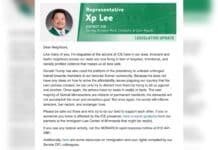A number of new laws went into effect in Minnesota on Aug. 1. Policy-based legislation that doesn’t include a specific enactment date typically goes into effect on Aug. 1.
New laws that went into effect in Minnesota on Aug. 1 include:
- Increasing voting support for political parties to reach, maintain major party status: The election policy law modifies the standard for a political party seeking to be recognized as a major political party in Minnesota. Beginning in the November 2024 election, the party must receive votes from at least 8 percent of the total number of voters in an election for a statewide office. The previous threshold was 5 percent.
- Stronger penalties for doxxing personal information of election officials: Current law prohibits someone from making personal information about an election official or their family or household member publicly available without consent if the information’s availability poses an imminent and serious threat to the safety of the official, their family or household member and the person making the information available knows of any imminent or serious threat. The definition of “personal information” is now expanded to include the official’s home telephone number, cellphone number, personal email address, minor children’s names, and pictures of the official’s minor children.
- Swatting penalties increased if involved in threats to elected officials and judges: The charge for making a fictitious emergency call that a serious crime is underway has now increased from a gross misdemeanor to a felony when a “swatting” call sends first responders to the home of an elected official, judge, prosecuting attorney, employee of a correctional facility or peace officer. Earlier this year Republican Congressman Tom Emmer said his home was the target of a “swatting” call.
- Penalty for a straw purchase of firearms increases from a gross misdemeanor to a felony: A straw purchase occurs when a person buys a gun for a person who is ineligible to possess firearms. Under the new law, an affirmative defense is provided for defendants if they can show by clear and convincing evidence the transfer was made because of “reasonable apprehension … that refusal would result in the transferee inflicting substantial bodily harm or death on the defendant or a family or household member of the defendant.” The provision was included in an omnibus bill passed in May, after legislators from both parties expressed support for the measure following revelations that a Burnsville felon who shot and murdered two police officers and a firefighter in February had his girlfriend buy the weapons for him.
A handful of new laws that have fiscal implications on the state budget went into effect last month on July 1.
New laws that went into effect last month (on July 1) include:
- If a political candidate is convicted of sharing AI-generated deepfake memes, does not have the subject’s consent, and if the sharer’s intent is to “influence the result of an election,” that candidate for office will be forced to forfeit their nomination for the office they are seeking. Similarly, a person convicted of breaking this law would be barred from receiving appointment to vacant public offices.
- A state school librarian position was created at the Department of Education in order to “provide advice and guidance in academic standards development and statewide library data collection from district and charter schools, and related activities … (and) support district and charter schools on issues of intellectual freedom, media and digital literacy, and growing lifelong readers.” This is related to a “ban on book bans” bill that Gov. Tim Walz signed into law.
- A 50-cent delivery fee that the DFL passed in 2023 went into effect on July 1. It applies to purchases at or over $100 of clothing or personal property subject to a sales tax. The revenue raised will be allocated to the department of transportation for road improvements across the state. The $100 threshold for the fee includes all parts of the sale, including shipping charges and other taxes. Food, medicine and certain baby products are exempt from that fee. Retailers with less than $1,000,000 of retail sales the previous year, and marketplace providers with less than $100,000 of retail sales are exempt from the fee.
Hank Long
Hank Long is a journalism and communications professional whose writing career includes coverage of the Minnesota legislature, city and county governments and the commercial real estate industry. Hank received his undergraduate degree at the University of Minnesota, where he studied journalism, and his law degree at the University of St. Thomas. The Minnesota native lives in the Twin Cities with his wife and four children. His dream is to be around when the Vikings win the Super Bowl.












